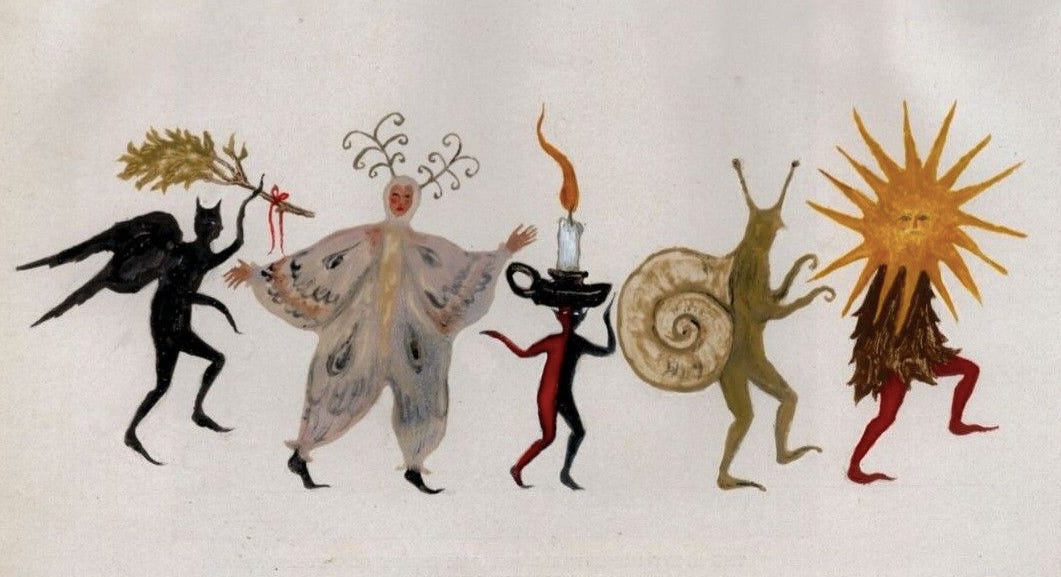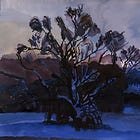There are quite a few new readers here after my feature in The Weekender. (Hello, thank you, welcome). I write these Morning Pages weekly and had planned to write something inspiring and poetic. I had tendrils forming in my notebook, crisp with the start of the year, yet my heart aches with ecological grief and overwhelm.
I imagine your radio and social media feeds have been as full of panic as mine this week — broadcasts of Californian wildfires, ongoing injustice and conflict, and the somewhat dystopian suggestion of Trump wanting to purchase Greenland.
My writing often touches on the natural rhythms and cycles of life, leaning on the beauty and solace that can be found outdoors. Stories within rocks and rivers, whispers from oak trees and ocean currents that soothe.
It seems then both insignificant and important for me to not over-romanticise or brush over the heaviness many of us are holding; often folded away in the quiet pocket where we place all the worldly sorrows.
I am not an expert in climate science, activism or politics. I know nothing about budgets, studies or data. What I do know to be true is the terror as I watch the destruction of habitats, communities and lives through natural disasters or man-made catastrophes such as war and consumerism, and that with each year, despite incredible community projects, campaigns and the relentless work of individuals nothing seems to change.
In The Work That Reconnects, Joanna Macy writes, “In order to heal our hearts, we need to acknowledge the brokenness of the world. When we feel that brokenness, we must allow it to open us, not close us. It is in the opening that we become part of the healing.”
Macy’s work feels like a balm in these times of hopelessness and destruction, much of which I experience through the 5-inch screen I hold in my palm.
On the one hand, I feel incredibly grateful and privileged, and on the other, I feel completely enraged and helpless. I land not between these two but in a state of paralysis, my mind awash with fear for the future, our collective future.
As Ursula Le Guin reminds us, “We live in capitalism. Its power seems inescapable. So did the divine right of kings. Any human power can be resisted and changed by human beings. Resistance and change often begin in art, and very often in our art, the art of words.”
To echo Ursula’s words, change often starts by simply acknowledging the reality we face.
I, like you, see the suffering we cause our fellow kin, the injustice in our politics, the insidious destruction of our food systems, and the unfathomable damage we cause to our most fragile landscapes and innocent species. Here in the UK, shit is literally pumped into our waters, our dwindling wildlife habitats are destroyed and flooding, storms and drought are intensifying year on year.
As a child, even growing up in dull, asphalt towns, I have memories of climbing apple trees and making friends with the everyday suburban residents: hedgehogs, bats, bees and adders, to name a few.
My garden was a city of dandelions, finches and ladybirds. I would spend hours with the lavender bush or follow some small creature to learn where it lived. When my brother and I built dens in the woods, the sounds were incredible, an orchestra of life.
I know the richness of these memories is not a dream.
In the last 50 years (33 of them are my lifetime), biodiversity in the UK has declined by approximately 41%. Many species now face a higher risk of extinction due to habitat loss, climate change, and human activity. Additionally, around 50% of our ancient woodlands have been lost.
Of course, I am not comparing this to the immediate horrors of war or natural disasters; however, everything is connected — and we’re slowly waking up to it. Even the very concept that nature is separate from us is a slow and steady chokehold.
What do we do now?
I will not pretend I have the answer to this huge and holy question.
Joanna Macy writes “Active hope is not wishful thinking. Active hope is not waiting to be rescued by some saviour. Active hope is waking up to the beauty of life on whose behalf we can act. We belong to this world. The web of life is calling us forth at this time. We’ve come a long way and are here to play our part.”
Here, today, I extend my hand to yours, in active hope, to hold in the grief of this unravelling. So that we don’t look away, that we feel and acknowledge the brokenness of the world, and in doing so find the courage to change it.
I wonder, if we all held hands, despite our differences, would we see that we have the power, compassion and generosity to protect what we love, our only home, the beloved earth?
I could offer you a list of books, documentaries, and resources, but instead, I encourage you to look in your locality for ways you can support causes that are close to your heart. Consider donating to emergency appeals, engaging with grassroots campaigns, volunteering at a charity, or getting involved with your council.
If you’re in the snacking mood, here are key takeaways:
꩜ Acknowledge the Pain: Don’t look away. Feeling grief is part of healing and action.
꩜ Active Hope: It’s not waiting for a saviour. It’s doing what we can, right now, however small.
꩜ Reconnect: Remember what you love about nature. It’s the first step toward protecting it.
Thanks for reading. If you liked this, you may also enjoy…
To receive new posts and access the growing archive of lists and personal essays, consider becoming a free or paid subscriber for £30 a year.






